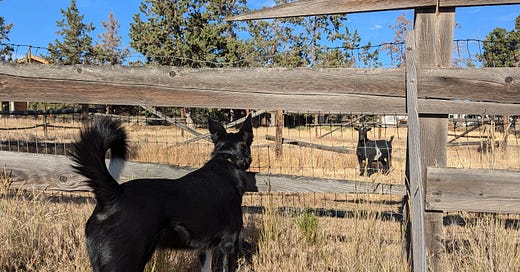Other Than Correct, Obvious, and Good; being a person is complicated
On Ivy Brashear's essay “The Appalachia I Know is Very Much Alive”
For your Old Truck Good Coffee today, I hope you will take the time to read Ivy Brashear's essay “The Appalachia I Know is Very Much Alive” in Appalachian Reckoning: A Region Responds to Hillbilly Elegy.1
Perhaps pair it (in the manner of the incomparable Maria Popova of The Marginalian2 with the Wikipedia article on the philosophical discussion of The Other.3
Brashear's essay starts where a lot of great essays start; with an interesting, illustrative story. One person doing one thing (stopping dust-distributing coal trucks with a Cadillac and a .38). But the very purpose of the essay and the book is that we need to see that story and then move on to another story. We need to gather stories of our Others in order to understand them.
Humans gather stories, but I am not so sure our modern selves know how to use stories without hurting ourselves with them.
We can use stories of our Others to enrich our connection to the world around us.
Or we can use them to further armor our afraid sense of self from The Other.
Our Others are powerful. As Hegel notes in the Wikipedia article (Feel free to read deeper. I get a lot out of the struggle of parsing Hegel), when we think about our Other we draw the border of how we are conscious of our selves.
A solitary story of my Other — say an other type of American — can help me to further understand who I am as Not That. Our sense of self gains confidence and strength. However, it does not help me understand that Other community socially, politically, or personally. I am only using them to further define my own story. It reinforces that I am Correct, Obvious, and Good.
Outside of story, in lives through long stretches of time not tracked, are the experiences and reasons of a community and a person. We — and They — are more than a story.
If you just use stories to protect yourself, the option of looking at the Other along a different practice is full of fear. To break down the model we have of each other breaks down our definition of our self as Correct, Obvious, Good. It is troubling to a person to allow for another Correct, Obvious, Good.
Much easier is to take the wacky story of Brashear's grandma and say that people out there are wacky.
What can we conclude from one wacky story? That Other people are different than us, which is a great relief because they are wacky. We can decide that we would never do that. We can decide that the cause is genetics, the decisions of an active God, or economics.
By stopping at the story, we can hold them at arms length from our Correct, Obvious, and Good. We can pretend that we have done sophisticated Story Math and come to the mathematical mean or average of a people.
If you are ever asked to be a representative of your community, you are in trouble. I am not an average or a mean of Central Oregon. Nor of Portland. Nor of Oregon. And if someone is seeking to understand a place or a people by a single representative or the conclusions of that person, they are not trying to understand. They are seeking to further armor their fragile self consciousness by protectively defining the Other.
We can take more time. Instead of treating humans as something we can sum, we can unroll our stories as unending tapestries. We can be continually curious as the Other is revealed.
https://www.themarginalian.org. If you sign up for just one other email list, let it be hers.





